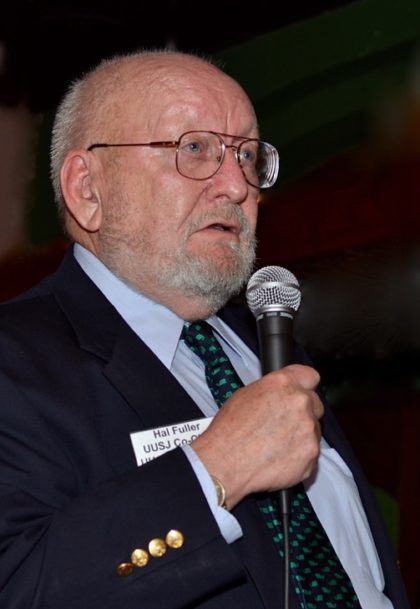At the memorial service for Hal Fuller, long-time UUSJ leader, previous Board Co-chair, and member of the UU Congregation of Fairfax, his daughter read his powerful “Why I Went to the GA” essay, which reflects his upbringing in New Mexico. His words then deserve our careful attention now, as our nation continues to wrestle with social and racial justice issues.

This year the Unitarian Universalist Association General Assembly was held in Phoenix. The purpose of this “Justice GA” was to show support for UU congregations in Arizona and solidarity with undocumented immigrants in their struggle with the effect of repressive legislation.
These are both worthwhile causes. But that is not why I went to the GA. I went because I grew up next door in New Mexico. There, I witnessed firsthand the dehumanizing effect of racial and ethnic discrimination directed at my friends and schoolmates.
Ironically, not a single one of these individuals was an immigrant. Some were the children or grandchildren of Mexican immigrants; many were the descendants of Europeans who had settled in the area hundreds of years before it was conquered by the U.S. Some were descendants of indigenous people who had lived there for tens of thousands of years. All bore Hispanic surnames and therefore were called “messkins,” “greasers,” “spics,” or worse by those Anglos who exploited and despised them.
I went to GA for Emilano, who sometimes worked on my family’s homestead. He carried me on his shoulders across our fields and pastures. Emilano came home from World War II a hero, but died the town drunk. Perhaps the only way he could recapture the temporary adulation he received upon his return was through an alcoholic haze.
I went for Leandro, who against all odds made it through college and returned to our school as its first Hispanic teacher, only to be refused entrance to a community dance in the school gym by one of the school board members. Anglos had their dances; Mexicans had theirs. Separate but equal?
I went for Ramon. When he cut a particularly loud and smelly fart one day in third grade, the teacher made him take off his pants and shake them out. Right in front of everybody. Even at eight years old, I knew that would never happen to an Anglo kid.
I went for Mary Helen, who lived on the homestead down the road from us. She died all too young from breast cancer. Hispanics have a higher death rate from almost all kinds of cancers than Anglos. Late diagnosis, little insurance, and little money for treatment.
I went for Ida, who drifted into alcohol, drugs and prostitution. We could not locate Ida when it came time for our 40th class reunion. One of her cousins said she was around, but probably didn’t want to be found.
I went for Carlos. Together, we formed the center line of a championship football team. We were invincible. Carlos worked his way through a U.S. Army enlistment by playing football. I was told that some years later he died in a barroom knife fight. Was he trying to recapture the honor of his gridiron days?
I went for Jack. Jack was so proud when a history teacher told us that his surname was the Hispanic version of an Irish surname—probably bestowed by an Irish adventurer who reached New Spain in the 16th or 17th centuries. How sad that Jack could not be equally proud of his Spanish and Indian heritages.
I went for Pete, who counted among his probable ancestors a “buffalo soldier”— one of the Negro U.S. cavalry troopers who protected the Anglos and Mexicans alike from Apaches and Navajos (and vice versa) during the post-Civil War period. Pete eventually moved to a large Midwestern city where perhaps he found the acceptance that largely was denied him by both the Anglo and Hispanic populations of our home town.
I went for Mike. After suffering more than his share of indignities—both small and large—Mike went to the town cemetery (Mexicans on one side of an invisible fence; Anglos on the other). He lay down between his parents’ graves, stuck a shotgun in his mouth, and blew away the top of his head along with unbearable pain and sorrow.
I went for my classmates. We were 40-odd when we started out—about half Anglo, half Hispanic. We were multicultural before multicultural was cool.
We graduated 20-odd—only two of whom were Hispanic. New Mexico still graduates less than seventy percent of its students who enter high school. Only Mississippi has a worse record.
I went for Claude and Rufino. I went for Carmen, Cecilia, Gloria, Inez, Ruth, and the others who fell behind and dropped out of school long before their potential was realized. They understood only too well that no amount of education would open doors for them. So why waste time in a system that was not welcoming?
I went to GA for all these long-ago friends and neighbors—mostly now dead, a very few still living.
I went for their grandchildren and their great- grandchildren, so that no more generations will know what it means to be dehumanized and to be denied the spark of divinity that resides in each of us.
But I also went for myself—perhaps most of all for myself—in hopes of exorcising the ghosts of actions I did not take and words I did not say on behalf of my Hispanic friends and neighbors and school mates of 60 years and more ago.
Would what I could have said, but didn’t—what I could have done, but didn’t—have significantly changed the courses of their lives? Probably not. But perhaps more words and stronger actions on my part could have provided them momentary comfort along a very bumpy road.
One thing I did learn at GA: It is never too late to start.

